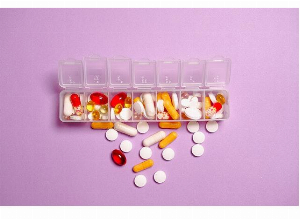Drugs and libido: Which treatments can affect your sexual desire?
Published Nov 18, 2024 • By Claudia Lima
For those managing chronic conditions, medications play an unquestionable role in relieving symptoms. However, some drugs may come with unexpected side effects, particularly when it comes to areas we might not anticipate, such as libido and sexual desire.
What is libido? How can certain medications, like antidepressants, antihypertensives, or diabetes treatments, influence sexual desire?
Don't let your drive take a dive, find out the answers in this article!

What are libido and sexual desire?
Libido isn't limited to sexuality. It represents our natural drive for pleasure and can show up in areas like creativity, social interactions, and even enjoying food. Sexual desire is a specific part of libido, focusing on physical attraction and the wish to connect intimately with someone. Libido can be influenced by several factors, including:
- Physical: fatigue, diet, and medication use.
- Psychological: stress, anxiety, depression.
- Hormonal: menstrual cycle variations, pregnancy, menopause.
- Relational: the quality of intimate relationships and communication.
- Environmental: lifestyle, occupation, and life rhythm.
Sexual desire specifically focuses on physical attraction and the wish to share sexual intimacy. When sexual desire or arousal is consistently low or absent, it may be diagnosed as hypoactive sexual desire disorder or arousal disorder.
How do certain medications affect libido and sexual desire?
Libido reflects emotional and physical well-being, but medications can impact it. For those with chronic illnesses, some prescribed medications have side effects that disrupt libido, complicating sexual health management. Men and women are affected differently; yet some medications, particularly antidepressants and psychotropics, affect both genders.
Let's explore the most common medications that may affect libido and sexual desire:
Antidepressants
Antidepressants are often linked to lowered libido, especially SSRIs (selective serotonin reuptake inhibitors) such as escitalopram (Lexapro®), citalopram (Celexa®), fluoxetine (Prozac®), fluvoxamine (Luvox®), paroxetine (Paxil®), and sertraline (Zoloft®). Other antidepressants, like SNRIs (serotonin-norepinephrine reuptake inhibitors) such as venlafaxine (Effexor®), can also reduce libido.
These medications adjust serotonin levels in the brain, a neurotransmitter that regulates mood and sexual desire. While effective against depression, they’re typically associated with reduced libido, difficulty achieving orgasm, and decreased sexual satisfaction.
Patients should discuss these side effects with their doctor, who may adjust the dosage, switch antidepressants, or suggest strategies to counteract this effect, such as adding bupropion or using sildenafil to boost libido, including in women, if no contraindications exist.
For managing behavioral disorders, certain psychotropics, like benzodiazepines used to treat anxiety, can lead to a decrease in libido. These medications are not antidepressants.
Antipsychotics
Used to treat disorders like schizophrenia and bipolar disorder, antipsychotics can affect libido in both men and women by lowering dopamine levels. Medications such as chlorpromazine, haloperidol (Haldol®), and aripiprazole (Abilify®) may reduce libido, vaginal lubrication, and orgasm. These drugs can also increase prolactin levels, leading to hormonal imbalances that affect sexual function.
Switching to second-generation antipsychotics, which have fewer sexual side effects, or using lubricants can help mitigate these issues. Psychotherapy may also help in managing this problem.
High blood pressure medications
Blood pressure medications, especially beta-blockers like propranolol (Inderal®), pindolol (Visken®), and atenolol (Tenormin®), as well as thiazide diuretics such as hydrochlorothiazide (Karvezide®), may negatively affect libido. These medications impact blood flow, reducing circulation to the genitals, which can lead to decreased sexual desire. This may result in erectile difficulties in men and vaginal dryness in women.
Other cardiovascular drugs, such as digoxin, amiodarone (Pacerone®), and statins (atorvastatin, Lipitor®; pravastatin, Pravachol®), may also interfere with sexual function. However, certain antihypertensives, like ACE inhibitors (e.g., benazepril, Lotensin®), have a lesser impact on libido.
Never stop hypertension medication without consulting your doctor, as they can help reduce sexual side effects through alternative options.
Diabetes medications
Diabetes treatments, especially insulin and sulfonylurea oral hypoglycemic drugs like glimepiride (Amaryl®), can alter libido.
Chronic high blood sugar and blood sugar fluctuations may disrupt hormones and impact libido. Additionally, medications that regulate blood sugar can cause side effects like fatigue and poor circulation, which directly influence sexual desire. Strict blood sugar management may help improve libido.
Pain medications
Opioids and certain strong non-opioid analgesics like tramadol (Ultram®) can reduce libido by affecting the central nervous system and altering hormone levels. These medications may impact sexual response by causing fatigue or depression.
Non-steroidal anti-inflammatory drugs (NSAIDs) and physical therapies may be lower-impact alternatives for those concerned about libido.
Alpha blockers
Alpha blockers, used to treat benign prostatic hyperplasia (BPH) and prostate cancer, may affect men’s sexual health in two ways. First-generation alpha-blockers like terazosin may cause erectile dysfunction by reducing blood flow to the penis, similar to blood pressure medications.
Second-generation alpha-blockers like tamsulosin (Flomax®) may lead to retrograde ejaculation, where semen enters the bladder instead of being expelled through the penis. This issue can sometimes be resolved by adjusting the dosage, although it isn’t always effective.
Other medications
Other medications that may reduce or eliminate sexual desire or arousal, or even cause anorgasmia, include antiepileptics, chemotherapy drugs like tamoxifen (Soltamox®), hepatitis medications, HIV treatments, thyroid medications, and hormonal contraceptives. However, psychotropics and cardiovascular drugs tend to have the most significant effects on libido.
There isn’t a specific medication to increase libido, but certain treatments can be adjusted in consultation with your doctor. Additionally, some people turn to herbal remedies such as ginger, maca, saffron, and ginseng, which may help stimulate sexual desire.
Key takeaways
Medications affecting libido are primarily psychotropics (neuroleptics and antidepressants) and cardiovascular drugs. Older medications in these categories tend to have more side effects on libido than newer, more selective treatments.
Lower libido is a common medication side effect, but it doesn’t have to be permanent. Discussing this with your doctor is important, as adjusting treatment can significantly improve your quality of life.
Did you find this article helpful?
Give it a “Like” and share your thoughts and questions with the community in the comments below!
Take care!
Sources :
Tout savoir sur la libido, santemagazine.fr
Trouble de l'intérêt sexuel/trouble de l'excitation, msdmanuals.com
Quels sont les médicaments qui peuvent rendre impuissant, www.santemagazine.fr
Quels sont les médicaments qui ont une influence sur la libido, allodocteurs.fr
Les antidépresseurs diminuent-ils la libido, allodocteurs.fr
Ces médicaments qui nuisent à la sexualité, lepoint.fr
Antidépresseur et libido, quel lien, santemagazine.fr
Comments
You will also like

What are the dangers associated with the over-the-counter sale of certain medicines?
Dec 19, 2020 • 6 comments

 Facebook
Facebook Twitter
Twitter

